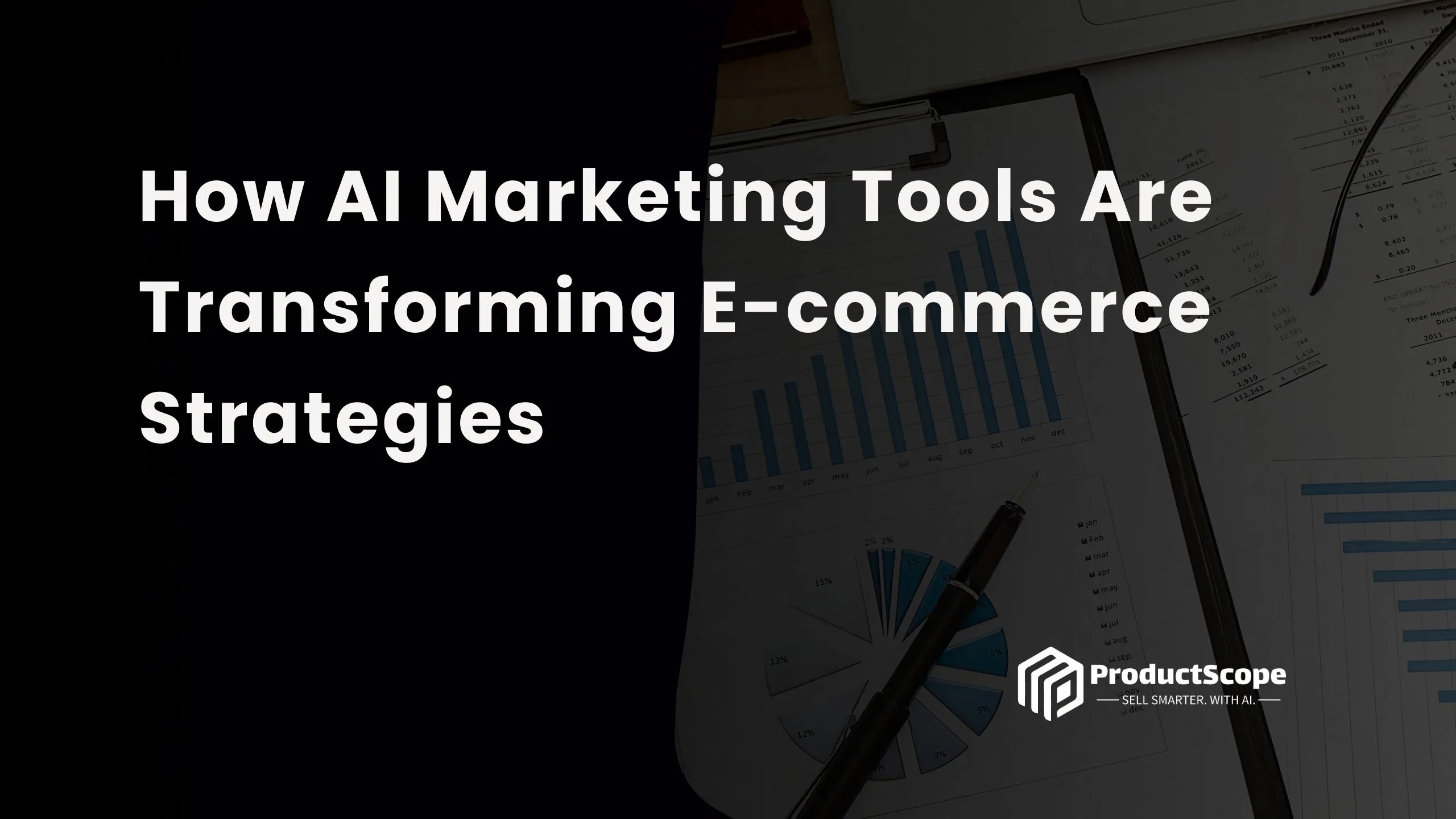E-commerce marketing is being revolutionized by artificial intelligence (AI). As AI marketing tools become more advanced and integrated into online retail strategies, they are unleashing creativity in the way brands engage customers.
From personalized product recommendations to predictive analytics, AI grants e-commerce marketers superpowers that were unimaginable just a decade ago. It is reframing long-held assumptions of what is possible.
This seismic shift promises to transform marketing approaches in e-commerce as AI capabilities accelerate. Understanding the evolving role of AI provides online retailers with immense opportunities to creatively improvetheir experiences and connections with customers.
The Evolution of E-commerce with AI

AI applications in e-commerce have rapidly advanced from basic customer segmentation in the early 2010s to the current explosion of innovation. AI is now integrated across virtually every aspect of digital retail.
Key milestones in this transformation include machine learning algorithms being utilized in 2012 for personalized recommendations based on purchase data. The success of Amazon and Netflix spearheaded this.
By 2016, AI filtered into core e-commerce platforms, allowing store owners to activate chatbots for improved customer service. AI also enabled dynamic pricing based on demand forecasts from historical trends.
Over the past few years, natural language processing (NLP), computer vision, and predictive analytics have upgraded AI capabilities even further. This led to groundbreaking applications in targeted advertising, emotionally intelligent chatbots, and supply chain optimization.
The next waves of innovation seem limitless, with Gartner predicting that by 2025, AI will drive over 80% of shopper interactions. As tools continue getting smarter, so will e-commerce brands in unleashing creativity in captivating and converting consumers.
How AI Tools Are Transforming E-commerce Marketing Strategies

Personalized Shopping Experiences
Creating personalized customer experiences is one of the most powerful applications of AI in e-commerce. Retailers can leverage intelligent algorithms to tailor product suggestions, search results, and overall shopping journeys to each visitor’s preferences.
Amazon has long dominated online retail thanks largely to its pioneering use of AI in personalization. Powerful machine learning algorithms enable product recommendations based on browsing and purchase history data. This accounts for over 35% of Amazon’s revenue.
Shifting consumer expectations are now pushing all leading e-commerce brands to follow suit. Marketers must serve individuals rather than segments if they want to cut through fierce competition.
Advances like conversational AI and emotion detection will only expand personalization capabilities further. Soon, not just product selections but navigation, content, and styling could be customized in real-time to delight each shopper.
Micro-personalization at such granular levels was impossible just a few years ago. Experimenting with these emerging tools represents immense potential for forward-thinking brands to unleash creativity in connecting with consumers.
Dynamic Pricing in E-commerce
Dynamic pricing allows e-commerce businesses to nimbly adjust product prices based on real-time market conditions by using AI algorithms. This approach replaces static pricing with data-driven models that maximize both profit margins and customer satisfaction.
By analyzing historical conversions at various price ranges while keeping production costs in mind, AI tools can reliably forecast optimal pricing levels. Factoring in seasonality, inventory levels, competitor actions, and demand fluctuations allows brands to respond quickly.
Dynamic pricing powered by machine learning has proven very effective in increasing online retail revenues. Business cases show 10–25% sales lifts depending on product categories.
Despite some consumer wariness, the transparency and personalization possible with AI reassure shoppers of fairness. Customers may receive unique coupons or loyalty discounts tailored to their price sensitivity, as determined by the algorithms.
As AI pricing models become more widespread, early adopters will gain a strategic edge over the competition. They can unleash creativity by promoting deals, bundles, and tailored incentives beyond pricing alone to attract converted buyers.
Enhancing Customer Service with AI Chatbots
AI-powered chatbots are revolutionizing e-commerce by providing customers with exceptional self-service experiences. These chatbots serve as a hub counter for customer inquiries, where all questions and interactions are centralized for efficient management. According to HubSpot estimates, over 60% of buyers now prefer chatbots for quick query resolution without waiting for human agents.
Intelligent conversational interfaces can answer common questions, recommend relevant products, process returns and exchanges, and even provide purchase support when integrated with order and inventory systems.
Leading online retail brands like Sephora and Everlane report over 70% of questions getting deflected by chatbots. This significantly reduces call volume and allows agents to focus on complex issues. Cost savings of up to 30% are achievable at scale.
But chatbots also present immense potential to boost revenue with personalized cross-sells and upsells during conversations. Session logs provide a wealth of customer data to fine-tune future marketing interactions across channels.
The latest chatbots can understand context, emotions and user intent through natural language processing. Continued advances will make conversations with AI assistants feel even more natural and satisfying.
As pioneers tap into these expanding capabilities, consumers stand to be delighted by highly relevant recommendations and problem resolution from chatbots designed creatively around their needs.

Content Creation and SEO in E-commerce
High-quality content remains essential for e-commerce brands to drive organic growth in 2023. AI is revolutionizing content creation by generating product descriptions, blogs, and web copy tailored to resonate with target personas while optimizing for SEO.
By analyzing millions of top-ranking listings, AI tools can produce content aligned with buyer keywords and search intent for improved click-through rates. Natural language generation handles not just drafts but revisions needed for trending topics.
E-commerce leaders leverage AI content in multifaceted ways, spanning UX copy, email campaigns, social media posts, guides, and more. All are tailored to integrate seamlessly with human-written materials for the brand.
For example, the Shutterstock e-commerce platform taps into AI for all its product description writing instead of overworked designers. Their technology even suggests relevant creative assets to reinforce messaging, boosting conversion rates by over 8%.
Such innovative applications of AI content creation promise to be a competitive advantage for ambitious retailers. The key is providing enough customer data for algorithms to learn about offerings, differentiators, and target audiences.
With sufficient inputs, AI can generate SEO-friendly content matching the brand’s tone and uniqueness at scale. Unleashing these tools creatively will be essential as expectations for engaging storytelling and personalization in e-commerce continue rising.
AI-Driven Lead Scoring for E-commerce
To maximize marketing ROI, e-commerce brands need to focus attention on promising leads instead of treating all prospects equally. This is where AI lead scoring comes in by rating interested contacts based on the likelihood of conversation using predictive analytics.
Sophisticated machine learning algorithms factor in attributes like past purchases, email engagement levels, and web behavior to calculate individual sales probability scores. Hot leads can then get fast-tracked for conversion while cold leads move to nurture streams.
E-commerce poses unique lead-scoring challenges due to short sales cycles and constantly changing products. Agile AI models adapt accordingly based on the latest trends, outperforming simplistic rule-based systems.
For example, jewelry brand PANDORA increased lead conversion rates by over 35% within 6 months of implementing an AI lead model tailored to their buyers’ path to purchase. The algorithms were continually refined based on new data signals.
Such strategic applications of AI will soon leap ahead through enhancements like sentiment analysis, lifetime value estimation, and even lead journey simulation. As e-commerce brands unlock these creative possibilities, superior results seem assured.

Predictive Analytics for Customer Insights
Modern marketing centers around deep customer insights to drive strategy and engagement. E-commerce brands leverage AI to unlock rich predictive analytics at each touchpoint for precise micro-segmentation, timely interventions, and relevant experiences.
Harnessing data creatively is opening new capabilities like churn and lifetime value modeling, historically only enjoyed by high-tech firms. Algorithms ingest behavioral signals across channels to outline customer health scores and likely triggers for defection or purchase.
Online fashion retailer SHEIN created a customized churn propensity model highlighting at-risk VIP members worth over $1000 lifetime value. Proactively addressing pain points tripled retention rates within this cohort.
In addition to retention tactics, predictive analytics guides acquisition plays. Data can reveal product affinity clusters among visitors to prioritize cross-sell offers per micro-segment. Algorithms even forecast individual price elasticity, purchase frequency, and the next order value.
Such intelligence powers superior eCRM strategies to activate audiences. As AI modeling matures, market leaders get better at unleashing relevant messages, incentives, and experiences to delight customers.
AI in E-commerce Advertising
E-commerce advertising is ripe for AI disruption as emerging tools promise previously impossible campaign optimization. Algorithms now handle not just targeting but creative personalization and full-funnel performance tracking for maximizing ROAS.
Top applications range from AI-generated display and video ads tailored to each viewer’s interests to new data-linking frameworks like conversational attribution. This traces how marketing touchpoints across search, social, video, etc. influenced a specific customer’s journey to purchase.
For example, leading athletic brand Under Armour achieved a 3X increase in return on ad spend by focusing on creatively optimized video ads per audience segment. Their AI platform rendered dynamic workout imagery, speaking uniquely to fitness buffs, runners, and athletes for higher relevance.
Soon we may even see simulated test environments where e-commerce campaigns get refined through unlimited AI iteration prior to launch. Breakthroughs like Google’s Pub/Sub framework enable this by mimicking real-time consumer reactions.
Such innovation promises to redefine digital advertising effectiveness as AI elevates relevance. Instead of disruptive ads, branded storytelling can seamlessly inspire customers by unleashing data creatively to resonate emotionally.
AI for Customer Segmentation in E-commerce
Micro-segmentation is pivotal for e-commerce brands aiming to deliver relevant messaging amidst overloaded consumer attention spans today. While rules-based segmentation has limitations in adaptability, AI unlocks robust dynamic clustering using machine learning algorithms.
By combining historical activity data, declared preferences, and contextual inputs, AI builds rich customer personas that go deeper than just demographics. Predicting future value based on various engagement strategies also allows for optimal resource allocation per segment.
Pet supplies retailer Chewy attributes over 20% of revenue to their proprietary machine learning model for customer lifetime value. Granular behavioral segmentation enabled personalized incentives, driving repeat orders and virality.
Ongoing advances in AI enable nuanced identity stitching across devices and channels for a unified customer view in e-commerce. This omnichannel profiling powers superior personalization as brands can track micro-conversions across the purchase journey to delight shoppers.
Unleashing such technology creatively moves e-commerce marketing beyond primitive batch-and-blast techniques to actually interact with consumers more meaningfully. Nurturing relationships through AI-orchestrated experiences manifests perfect timing in prompting consideration and conversion.

Leveraging AI for Image and Video in E-commerce
As visual content dominates digital experiences, e-commerce brands tap the creative storytelling potential of AI for enhanced image and video content. Beyond just product images, AI is upgrading applications like virtual trial rooms and video advertising.
Algorithms can now automatically curate shoppable video footage and dynamically rendered models catering to each user’s style preferences and size measurements. Instead of static catalog images, shoppers enjoy immersive and personalized visualization, uncovering unique possibilities.
Computer vision advancements also enable clever innovations like live mannequins that update poses based on social media trends. By unleashing such tech creatively, retailers stir emotions and heighten engagement beyond functional try-ons.
Influencer-grade production is also now possible for e-commerce brands by using AI to refine imagery. For example, Israeli startup AnyClip helps online retailers easily insert products into existing video content. Viewers perceive this as more authentic than hard-sell ads.
As tools democratize imagination with data-driven personalization in visual content, creativity is unleashed for both brands and audiences. Retail marketing continues to evolve beyond transactions into memorable editorial storytelling thanks to AI.
Optimizing for Voice Search in E-commerce
Voice-based shopping promises to drive the next transformation in e-commerce. Early stats of 50% of consumers using voice assistants highlight the vital need to optimize for voice search ahead of the curve.
Just as mobile disrupted digital two decades ago, vocal queries escalated rising expectations for conversational commerce. Winning brands will creatively harness AI to deliver intuitive dialogue around buying guidance and recommendations.
This requires reimagining e-commerce information architecture and copywriting for spoken queries without visuals. Tools like Google’s SEO for Voice Search Guide highlight core considerations around natural language, local answers, and site-structured data.
Startups like Searchbot.ai also offer AI-powered solutions tailored to e-commerce sellers for optimizing voice search visibility. Capabilities range from transcription analysis to testing the vocal relevancy scores of product schema.
As vocal shopping gains mainstream traction, voice AI consultancy will emerge as a necessity for online retailers. The durability of techniques like schema markups for rich answers will decide market winners.
Unleashing this wave strategically will set some e-commerce brands apart over the next decade. We are still only scratching the surface of what’s possible as voice AI, NLP, and analytics evolve.
Conclusion
AI innovation is rapidly transforming e-commerce by unlocking boundless applications across the customer journey. From shopper personalization to voice assistants and individually tailored experiences, data-driven intelligence promises to redefine shopping.
E-commerce brands need to continually experiment with emerging tools to stay competitive while avoiding potential pitfalls around data transparency. Creatively leveraging AI to enthral customers instead of overwhelming them will decide market leadership.
As algorithms grow more powerful and integrated into e-commerce, marketing strategies must unleash AI’s potential not just for efficiency but also for value creation through inspired connections between consumers and brands.
Transform your e-commerce with ProductScope AI! Get 100 free photos and instantly create stunning, Instagram-ready product images. Optimize your Amazon listings with AI-driven insights and high-impact keywords. No credit card required to start. Elevate your brand’s visual appeal and sales with our easy-to-use AI tools. Start for free at ProductScope AI and revolutionize your online presence!
Sign Up for ProductScope AI Today!
FAQs
How Is AI Transforming E-commerce Marketing Strategies?
AI is revolutionizing e-commerce marketing by enabling personalized customer experiences, optimizing pricing strategies, automating customer service with chatbots, enhancing content creation, and providing insightful data analytics for better decision-making.
What Are the Benefits of Using AI in E-commerce?
AI offers numerous benefits in e-commerce, including improved customer personalization, efficient inventory management, enhanced user experience through chatbots, predictive analytics for better targeting, and automation of repetitive tasks, leading to increased efficiency and sales.
Can AI Improve Customer Engagement in E-commerce?
Yes, AI significantly improves customer engagement in e-commerce by providing personalized recommendations, creating interactive shopping experiences, and offering prompt customer service through AI-powered chatbots, leading to enhanced customer satisfaction.
How Does AI Personalize the Shopping Experience?
AI personalizes shopping experiences by analyzing customer data, such as past purchases and browsing behavior, to offer tailored product recommendations and content, making each customer’s journey unique and more relevant to their preferences.
What Role Does AI Play in E-commerce Content Creation?
In e-commerce, AI aids in content creation by generating product descriptions, optimizing SEO, and creating targeted marketing materials. AI tools can analyze consumer trends to produce content that resonates with the target audience, improving engagement and conversion rates.
How Can E-commerce Businesses Implement AI in Their Strategies?
E-commerce businesses can implement AI by integrating AI-powered tools for customer service (like chatbots), utilizing predictive analytics for inventory and pricing, adopting AI for personalized marketing campaigns, and leveraging AI for data-driven decision-making.

